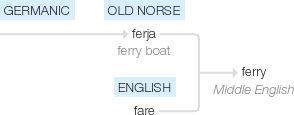Ferry
Middle English: from Old Norse ferja ‘ferry boat’, of Germanic origin and related to fare.
wiktionary
From Middle English ferien(“to carry, convey, convey in a boat”), from Old English ferian(“to carry, convey, bear, bring, lead, conduct, betake oneself to, be versed in, depart, go”), from Proto-West Germanic *farjan, from Proto-Germanic *farjaną(“to make or let go, transfer, ferry”), from Proto-Indo-European *per-(“to bring or carry over, transfer, pass through”).
Cognate with German dialectal feren, fähren(“to row, sail”), Danish færge(“to ferry”), Swedish färja(“to ferry”), Icelandic ferja(“to ferry”), Old Norse ferja. Related to fare.
etymonline
ferry (v.)
Old English ferian "to carry, convey, bring, transport" (in late Old English, especially over water), from Proto-Germanic *farjan "to ferry" (source also of Old Frisian feria "carry, transport," Old Norse ferja "to pass over, to ferry," Gothic farjan "travel by boat"), from PIE root *per- (2) "to lead, pass over." Related to fare (v.). Related: Ferried; ferries; ferrying.
ferry (n.)
early 15c., "a passage over a river," from the verb or from Old Norse ferju-, in compounds, "passage across water," ultimately from the same Germanic root as ferry (v.). Meaning "place where boats pass over a body of water" is from mid-15c. The sense "boat or raft to convey passengers and goods short distances across a body of water" (1580s) is a shortening of ferry boat (mid-15c.).
